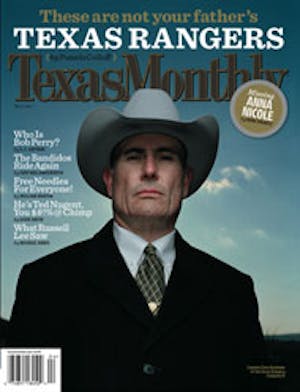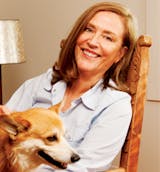AT A PARTY LAST NIGHT I received two lovely compliments—one on a new pair of glasses, another on my raincoat. To the first I replied, breathless as Ron Popeil touting the Veg-O-Matic, “Can you believe I got these off the Internet?! With prescription lenses?! For $19.95?!” Upon hearing the second, I held out the water-repellent fabric, inviting inspection, and exclaimed with Ginsu-knife-level enthusiasm, “Fifteen dollars at Ross! On clearance!”
Is a simple, gracious “Thank you” out of the question? For me, apparently, it is. Issuing these annoying bargain bulletins seems hardwired into the Bird DNA. I believe our family crest features a blue light and the motto Nunquam persolvo plenus pretium (“Never pay retail”). When my siblings and I get together, it immediately turns into a reenactment of “The Rag Trade: The Early Years.” We finger one another’s new garments and nod at shoes and handbags and mutter, “Nice. How much?”
Then things get competitive. “Eighteen little ones. Foley’s Red Apple Sale. With an extra-ten-percent-off coupon.” “Five bucks for everything you can cram in a bag at Garbo Grande.” “Swear to God, they paid me to walk out of the store with this.” And we have a winner.
This was all encoded very early on by our mother, Colista McCabe Bird, a.k.a. Nurse Bird or Collie Mac, who raised six children on vats of macaroni and cheese, half sticks of Juicy Fruit gum, and endless ingenuity. I loved it when Nurse Bird snatched up her purse and announced, “Let’s go see what they’re giving away today!” For my sisters and me—though a bro or two were known to surrender to the hunt—this meant a day of trolling our favorite discount outlets.
Collie Mac’s preferred venue was Pic ‘N’ Save—the Pick—home to the odd lot, the off-brand, the discontinued, the Third World, the merchandising fiasco. At the Pick a savvy patron could load up on Battlefield Earth lunch boxes, Dick Tracy flyswatters, Waterfraud crystal, plantain soda, and mugs from China that heated up to lip-blistering temperatures in the microwave. Those mugs and an assortment of safety-recalled products shunned by wimpier shoppers (home electrolysis kits, ceramic baby toys, wrought-iron furniture from Chernobyl) caused my law student brother to call the place Pic ‘N’ Arraign. We were not daunted—not when we were Team Bird, trailing behind Collie Mac as she piloted her cart down the aisles, schooling us in what was and was not Bird-esque.
Nurse Bird’s genius was in turning the necessary economies of raising half a dozen voracious offspring on one scrawny salary into a game. The winner was whoever scored the biggest bargain, and the loser was the dupe who paid full price, the chump who fell for a brand name. Who needed Guess jeans when you could pick up a pair of Happy Girl Dances for a fraction of the cost? Why bother with a Lacoste polo when, for a mere pittance, you could acquire a garment that was virtually identical after you took a pair of cuticle scissors and snipped the Meow Mix Premium Cat Food logo off the front pocket? The underlying message was, Anyone can look good if she wants to shell out the big bucks at high-end emporiums like Sears and Montgomery Ward. Try doing it the Bird way for next to nothing at Next to New.
My happy embrace of the cut-rate served me well when I entered the glamorous, high-paying world of writing. In years gone by, the IRS used to take pity on writers and bunko artists by allowing us to average income over several years so that when long-term projects—the novel, the pyramid scheme—finally paid off, the hit wouldn’t be so bad. The last year our government permitted income averaging, I was surprised to discover that I’d lived on $3,000 a year for the previous three years. Even in Austin in the days before the Internet bubbled, that was mighty, mighty cheap. Yet thanks to 99-cent chicken-fried steaks at the late, lamented Stallion Restaurant and a childhood in which bargain was better than brand, I never felt the least bit deprived.
Gradually, though, monthly mortgage and insurance payments that were more than my annual income rendered my penny-pinching pointless. To say nothing of those unexpected expenditures: What does it matter that I saved big on an ultrasnazzy pair of Nine West wedges when I returned home with my score to find that “someone” had washed his cell phone? And that “someone else” needed dental surgery. And gas prices? What’s the sense in saving three bucks on a five-pack of Hanes underwear when it costs that much to get to the store?
None. Though my bargain shopping has become as ceremonial as the buffalo hunts that cattleman Charles Goodnight once staged for the few Indian braves who longed to honor the old days and the old ways, I cannot stop. So, there I was, feeling that my Nine Wests, my bargain drawers, were nothing more than the sad, and ultimately silly, moth-eaten buffalo robe of a bygone world when I read an article in the New York Times that contained some stunning news: The Neanderthals went extinct because their women didn’t shop enough.
It’s true. “Unlike modern humans, who had developed a versatile division of labor between men and women, the entire Neanderthal population seems to have been engaged in a single main occupation, the hunting of large game.” Neanderthalettes couldn’t be bothered with gathering. No, those nutty, slope-browed gals were all going to the office with their mates. And given what a hot and hairy hunka hunka burning love Mr. N. was, who wouldn’t have wanted to be with him all day bringing down the woolly and the saber-toothed? Why bother with herbs and berries, grubs, and Hanes on sale?
Why indeed? “Because modern humans exploited the environment more efficiently, by having men hunt large game and women gather small game and plant foods, their populations would have outgrown those of the Neanderthals.”
Gathering? What is gathering except shopping? Which makes bargain shopping practically a holy calling. So when you see me scouting around to find out what they’re giving away that day, don’t thank me. It’s enough to know that I’m doing my part to keep the species from going extinct.








